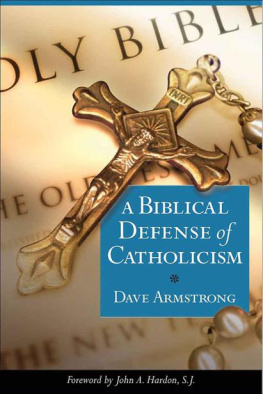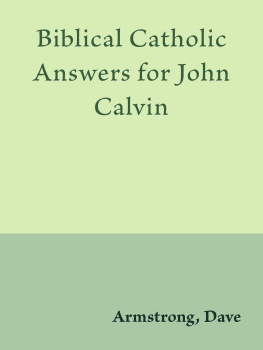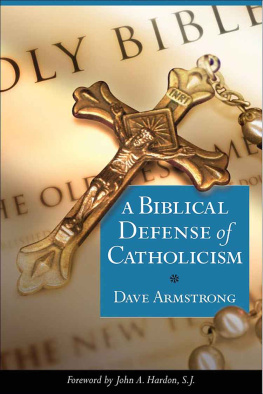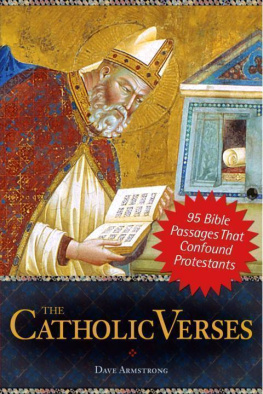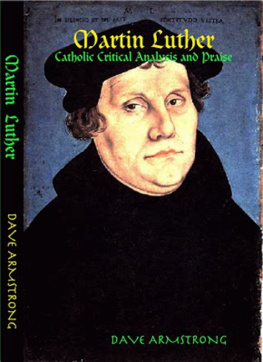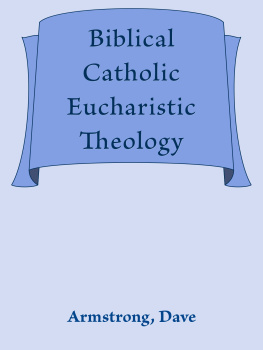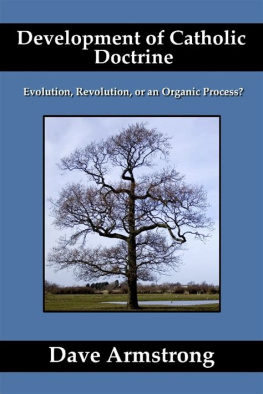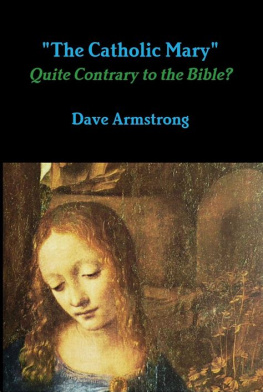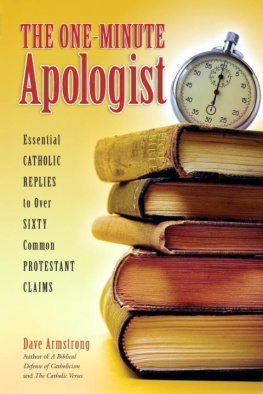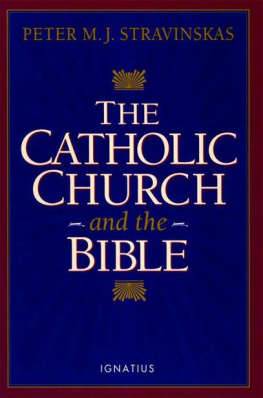Dave Armstrong - Proving the Catholic Faith is Biblical
Here you can read online Dave Armstrong - Proving the Catholic Faith is Biblical full text of the book (entire story) in english for free. Download pdf and epub, get meaning, cover and reviews about this ebook. year: 2015, publisher: Sophia Institute Press, genre: Religion. Description of the work, (preface) as well as reviews are available. Best literature library LitArk.com created for fans of good reading and offers a wide selection of genres:
Romance novel
Science fiction
Adventure
Detective
Science
History
Home and family
Prose
Art
Politics
Computer
Non-fiction
Religion
Business
Children
Humor
Choose a favorite category and find really read worthwhile books. Enjoy immersion in the world of imagination, feel the emotions of the characters or learn something new for yourself, make an fascinating discovery.

- Book:Proving the Catholic Faith is Biblical
- Author:
- Publisher:Sophia Institute Press
- Genre:
- Year:2015
- Rating:5 / 5
- Favourites:Add to favourites
- Your mark:
- 100
- 1
- 2
- 3
- 4
- 5
Proving the Catholic Faith is Biblical: summary, description and annotation
We offer to read an annotation, description, summary or preface (depends on what the author of the book "Proving the Catholic Faith is Biblical" wrote himself). If you haven't found the necessary information about the book — write in the comments, we will try to find it.
Proving the Catholic Faith is Biblical — read online for free the complete book (whole text) full work
Below is the text of the book, divided by pages. System saving the place of the last page read, allows you to conveniently read the book "Proving the Catholic Faith is Biblical" online for free, without having to search again every time where you left off. Put a bookmark, and you can go to the page where you finished reading at any time.
Font size:
Interval:
Bookmark:
Dave Armstrong
Proving the Catholic
Faith Is Biblical
From Priestly Celibacy to the Rosary:
80 Short Essays Explaining the
Biblical Basis of Catholicism
SOPHIA INSTITUTE PRESS
Manchester, New Hampshire
Copyright 2015 by Dave Armstrong
Printed in the United States of America. All rights reserved.
Cover design : Coronation Media in collaboration
with Perceptions Design Studio.
On the cover: Books on wooden table (144613493)
donatas1205 / Shutterstock.com and Grunge texture
(136495241) Allgusak / Shutterstock.com
Chapters 1, 8, 30-31, 51-52, and 80 of this book were originally published in The Michigan Catholic (May to August 2014). Chapters 9, 25-27, 32-34, 39-40, 42-43, 45, 61-62, 77, and 78 were originally published in Seton Magazine (March to July 2014).
Biblical citations are from the Revised Standard Version of the Bible ( 1971) copyrighted by the Division of Christian Education of the National Council of the Churches of Christ in the United States of America. All emphases have been added.
No part of this book may be reproduced, stored in a retrieval system, or transmitted in any form, or by any means, electronic, mechanical, photocopying, or otherwise, without the prior written permission of the publisher, except by a reviewer, who may quote brief passages in a review.
Sophia Institute Press
Box 5284, Manchester, NH 03108
1-800-888-9344
www.SophiaInstitute.com
Sophia Institute Press is a registered trademark of Sophia Institute.
Library of Congress Cataloging-in-Publication Data
Armstrong, Dave, 1958
[Essays. Selections]
Proving the Catholic faith Is biblical: from priestly celibacy to the rosary: 80 short Essays explaining the biblical basis of Catholicism / Dave Armstrong.
pages cm
Includes bibliographical references and index.
ISBN 978-1-62282-263-8 (pbk. : alk. paper) ePub ISBN 978-1-622822-645 1. Catholic Church Apologetic works. 2. Catholic Church Doctrines. 3. Bible Criticism, interpretation, etc. I. Title.
BX1752.A767 2015
282 dc23
2015013817
To my beautiful wife, Judy,
without whom my career, as it has proceeded,
would have been impossible.
Im deeply grateful always
for your never-ending support.
Contents
Introduction
This is a collection of essays that are (1) short (usually two or three pages), (2) characterized by lots of biblical argumentation, and (3) written in defense of Catholicism (apologetics). Most of them came about as a result of my ongoing efforts to comment on issues that regularly come up in worlds of Catholic apologetics and theology online.
The brevity of the chapters indicates the trend in my apologetic writing for many years now: quick, precise answers to apologetics questions. For better or ill, this is the world that we live in, and the apologist must make efforts (as St. Paul did, and as Vatican II stressed) to meet people where they are.
I dont deny the continuing utility and necessity of longer treatments (my corpus still contains plenty of those!), but most people prefer shorter essays, and their interest in theology and apologetics generally doesnt extend to treatise-length expositions. This is all the truer for beginners in theology.
Many of these essays were written as columns for Seton Magazine , which is devoted to Catholic homeschoolers. Others came from my regular column in The Michigan Catholic , the official newspaper for the Archdiocese of Detroit. Some were originally posted as part of my work in the Internet forum of the Coming Home Network from 2007 to 2010 (I was the head moderator during that period), and several were initiated on Facebook. All of these essays are meant to answer the questions that people ask and to make the Catholic Faith more understandable, leading to a confident belief and the ability to make a defense (1 Pet. 3:15) for this Faith as opportunities arise. I hope by Gods grace I have accomplished these goals.
Thanks so much for reading, and God bless you!
Tradition Is Not Always a Bad Word in Scripture
One might loosely define tradition as the authoritative and authentic Christian history of theological doctrines and devotional practices. Christianity is fundamentally grounded in the earth-shattering historical events in the life of Jesus Christ (His Incarnation, preaching, miracles, Passion, Crucifixion, Resurrection, and Ascension).
Eyewitnesses (Luke 1:1-2; Acts 1:1-3; 2 Pet. 1:16-18) communicated these true stories to the early Christians, who in turn passed them on to other Christians (under the guidance of the Churchs authority) down through the ages. Therefore, Christian tradition, defined as authentic Church history, is unavoidable, and is a very good thing: not a bad thing at all.
Many read the accounts of Jesus conflicts with the Pharisees and get the idea that He was utterly opposed to all tradition whatsoever. This is not true. A close reading of passages such as Matthew 15:3-9 and Mark 7:8-13 will reveal that He condemned only corrupt traditions of men, not tradition per se.
Jesus uses qualifying phrases such as your tradition, precepts of men , tradition of men , as opposed to word of God or the commandment of God and so forth. St. Paul makes exactly the same contrast:
Colossians 2:8 : See to it that no one makes a prey of you by philosophy and empty deceit, according to human tradition, according to the elemental spirits of the universe, and not according to Christ .
The New Testament explicitly teaches that traditions can be either good (from God) or bad (from men, when against Gods true traditions). Corrupt traditions from the Pharisees were bad , although many of their legitimate teachings were recognized by Jesus (see, e.g., Matt. 23:3). The spoken gospel and the apostolic writings (some eventually formulated as Holy Scripture) were altogether good: the authentic Christian tradition as revealed by the incarnate God to the apostles and ratified by the Church.
The Greek word for tradition in the New Testament is paradosis . It occurs in Colossians 2:8 and in the following three passages (among others):
1 Corinthians 11:2 : [M]aintain the traditions even as I have delivered them to you.
2 Thessalonians 2:15 : [S]tand firm and hold to the traditions which you were taught by us, either by word of mouth or by letter.
2 Thessalonians 3:6 : the tradition that you received from us.
St. Paul makes no distinction between written and oral tradition. He doesnt regard oral Christian tradition as bad and undesirable. This is made even clearer in two other statements to Timothy:
2 Timothy 1:13 : Follow the pattern of the sound words which you have heard from me.
2 Timothy 2:2 : and what you have heard from me before many witnesses entrust to faithful men who will be able to teach others also.
St. Paul is here urging Timothy not only to follow the oral teaching that Timothy had heard from him but also to pass it on to others . This is a clear picture of authentic historical continuity of Christian doctrine precisely what the Catholic Church calls sacred tradition or, when emphasizing the teaching authority of bishops in the Church, apostolic succession .
The phrase deposit of faith is also used to describe the original gospel teaching as handed over or delivered to the apostles (see, e.g., Acts 2:42; Jude 3). The Catholic Church considers herself merely the custodian or guardian of this public revelation or deposit from God, because we believe that God set up His Church (Matthew 16), making St. Peter the leader, and that the Church has continued through history ever since. Its all Gods doing, not ours. We participate in His plan only by His grace and mercy.
When the first Christians went out and preached the gospel of Jesus Christ after Pentecost, this was oral tradition. Some of it was recorded in the Bible (e.g., in Acts 2) but most was not, and indeed could not be, for sheer volume (see John 20:30; 21:25). It was primarily this oral Christian tradition, not the text of the New Testament (many, if not most, people couldnt read then anyway) that turned the world upside down).
Next pageFont size:
Interval:
Bookmark:
Similar books «Proving the Catholic Faith is Biblical»
Look at similar books to Proving the Catholic Faith is Biblical. We have selected literature similar in name and meaning in the hope of providing readers with more options to find new, interesting, not yet read works.
Discussion, reviews of the book Proving the Catholic Faith is Biblical and just readers' own opinions. Leave your comments, write what you think about the work, its meaning or the main characters. Specify what exactly you liked and what you didn't like, and why you think so.

